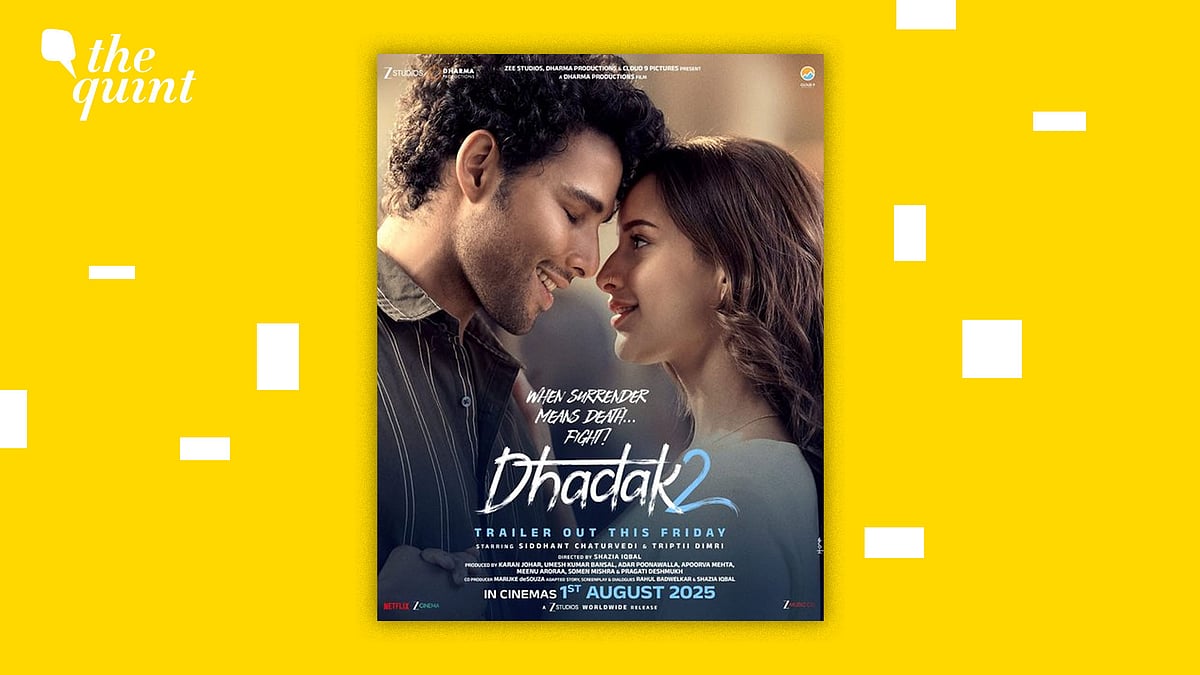
'Dhadak 2' Isn't Just a Love Story—It's a Caste Reckoning
The movie makes you feel like you’ve been punched in the gut, writes Dushyant Arora.

advertisement
“Mill workers ki biwiyan choodiyaan pehenne ke liye nahin, todne ke liye khareedti hain" (Wives of mill workers buy bangles not to wear them, but to break them).
This is a dialogue from Kaala Patthar, a masala commercial blockbuster.
“Ye wo building hai jahan meri maa eentein uthaaya karti thi" (This is the same building where my mother used to lift bricks).
From another commercial blockbuster, 'Deewaar.'
The first film is about the exploitation that mine workers suffer and the greed of mine owners. The second is about a maligned union leader, his son who becomes a coolie, and then a criminal. It is about crime and punishment.
I believe India has found her next Yash Chopra, in Shazia Iqbal, the director of Dhadak 2, which has released today.
The Social Realities of Dhadak 2 Feel Real
The film is the official Hindi adaptation of Pariyerum Perumal, but it is not a copy paste job, far from it. It adds multiple tracks which weren’t there in the first, and the world Shazia builds, and the lens she brings to it are extraordinary, to put it mildly.
Two such tracks—one, of the confident, assertive, 'I refuse to be a timid bystander and submit to patriarchy' character played by Tripti Dimri. The second, a character played by Priyank Tiwari, who reminds you of one of India’s most tragic sons.
Many well-meaning films get this order wrong, with terrible results. They feel preachy, boring, shallow. No one wants to go to the cinema to be schooled or shamed. Dhadak 2 is very, very different.
Your heart skips a dhadak over the romance Tripti-Siddhant (Vidhi-Neelesh) share. It makes you laugh at the jokes the protagonist’s friends crack—yes aunty, all the women in the world are trying to seduce your son, you must protect him they say. You laugh, cry, long, wait, and hope for the “hero” to beat up the “villain”.
It annihilates arguments against reservation. It will convince you that not only is reservation necessary, it is inadequate. Neelesh’s initial reluctance and compliance with the system has grave consequences. Vidhi’s cluelessness about caste, even as she is very aware of gender discrimination, makes her romantic partner suffer tremendously.
The principal, played by the always reliable Zakir Hussein, also has blood on his hands. Harish Khanna, who play’s Tripti’s father, is the evil in denial archetype. The kind of person who manages to be passively evil and yet convinces themselves that they’re largely moral.
What Hits the Most About the Film
The star performance in the film, for me, is by Vipin Sharma, who plays Neelesh’s cross-dressing father. He portrays tenderness like it has never been portrayed before.
I don’t want to give spoilers, but Indians will be repeating many dialogues of this film decades from now.
The film is centered in a college. Dharma Productions has made a film about college students. The production house has come a long way from Pyaar Dosti Hai, to Pyaar Kranti Hai.
The film is a product not only of exceptional courage, but also exceptionally deep, and a very lived understanding of society. There is no lazy, shallow, Twitter-liberal jargon here, the kind which creeps into too many films made by the ultra-rich who have the right intentions but don’t have the faintest clue. And because of this, because of the the vision Shazia Iqbal brings to this film, it delivers not only shock, but also awe. Awestruck is how I felt when the lights came on.
How many stars will I give to this film? I will give four, not stars, but words.
Thank you Shazia Iqbal.
(The author is a lawyer and research consultant based in Mumbai. This is an opinion piece, and the views expressed are the author’s own. The Quint neither endorses nor is responsible for them.)
- Access to all paywalled content on site
- Ad-free experience across The Quint
- Early previews of our Special Projects
Published: undefined